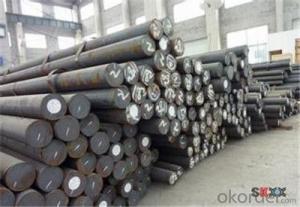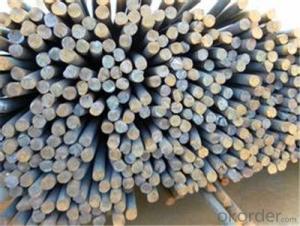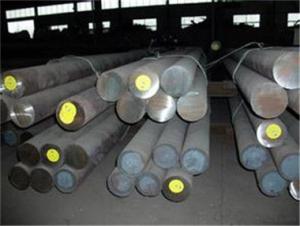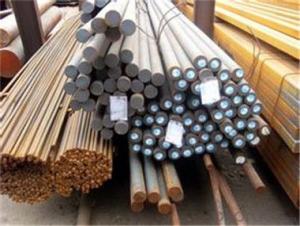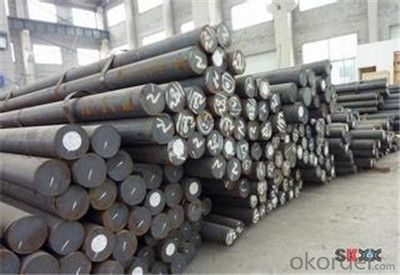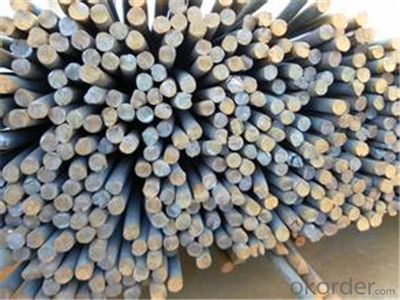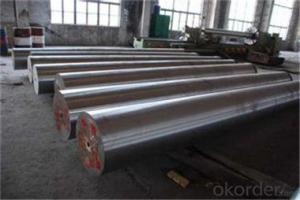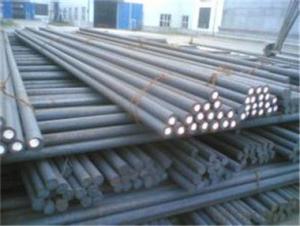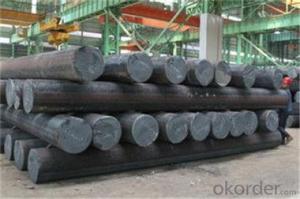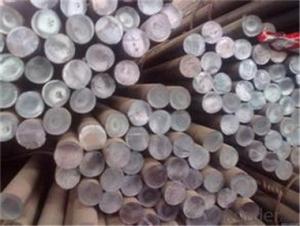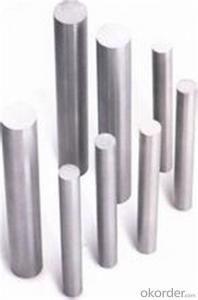Steel Round Bar Reliable Manufacturer with from China
- Loading Port:
- Tianjin
- Payment Terms:
- TT OR LC
- Min Order Qty:
- 100 m.t.
- Supply Capability:
- 2000000 m.t./month
OKorder Service Pledge
OKorder Financial Service
You Might Also Like
Description of steel round bar:
1. Commodity: Round steel bar
3. Technical: Hot rolling
2. Length: Min. 5.8meter, according to requirement.
3. Diameter: 16mm-250mm
5. Packing: In Bundle or according to your requirements.
Festures of steel round bar:
1.Dia 80-800mm Length:2000-13000mm or as required
2.Technique:Forged
3.Delivery Time:45 days
Specifications of steel round bar:
1. Standards: AISI 4340 8620 8640 4320 , JIS SNCM8 GB:40CrNiMoA
2. Specification: Dia: 80~450mm Length:2000-13000mm or as required
3. Process: EAF+LF+VD ( necessary) UT+ Peeled +Turned + Heat Treatment (optional)
4. Chemical Composition (%):
C | Si | Mn | S | P | Cr | Ni | Cu | Mo |
0.37-0.44 | 0.17-0.37 | 0.40-0.80 | 0.025(max) | 0.025(max) | 0.60-0.90 | 1.25-1.65 | 0.025(max) | 0.15-0.25 |
Images of steel round bar:
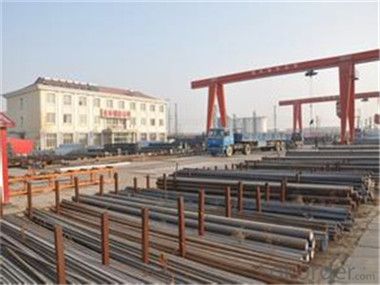
FAQ:
1. What is your package?
Packing situation: standard seaworthy packing or as customer required.
2. How long is the lead time?
Delivery time: 45 days after order confirmed.
3. What payment term do you accept?
Payment: T/T or L/C at sight.
- Q: What are the different types of steel round bar profiles?
- In the market, one can find various steel round bar profiles. Among the most commonly used profiles are: 1. Plain Round Bar: This profile is the most basic and widely used. It consists of a solid cylindrical bar with a smooth surface and a consistent diameter throughout its length. 2. Deformed Round Bar: This type of round bar features deformations or ribs on its surface. These deformations enhance the bond between the bar and concrete, making it ideal for construction applications requiring reinforced concrete structures. 3. Hollow Round Bar: As the name suggests, this profile has a hollow center. It is often utilized in industries where weight reduction is crucial or when the round bar needs to serve as a conduit for fluids or gases. 4. Threaded Round Bar: This profile is characterized by threads along its length, enabling easy screwing into other components. It is commonly employed in applications that require secure fastening or adjustability. 5. Half-Round Bar: With one flat side and one rounded side, this profile takes on a semi-circular shape. It is frequently used in decorative applications, such as handrails, where an aesthetically pleasing appearance is desired. 6. Square Bar: Although not strictly a round profile, square bars are often included in this category. They possess four equal sides and find common use in applications that demand higher torsional strength. 7. Hexagonal Bar: Similar to square bars, hexagonal bars have six equal sides. They are often employed in applications that require high torque resistance or when a distinctive appearance is desired. These represent just a few of the available steel round bar profiles. The selection of a profile depends on specific application requirements, such as structural strength, bonding capabilities, or aesthetic considerations.
- Q: What are the different types of steel round bar alloys for improved hardness and strength?
- There are several different types of steel round bar alloys that are known for their improved hardness and strength. Some of the most common alloys used for this purpose include: 1. Carbon Steel: Carbon steel is a popular choice for its exceptional strength and hardness. It contains a higher percentage of carbon compared to other alloys, which enhances its overall durability and resistance to wear and tear. 2. Alloy Steel: Alloy steel is a combination of carbon steel and other elements such as manganese, nickel, chromium, or vanadium. These additional elements improve the hardness and strength of the steel, making it more suitable for applications that require high tensile strength and toughness. 3. Stainless Steel: Stainless steel is a corrosion-resistant alloy that contains a minimum of 10.5% chromium. The addition of chromium enhances its hardness and strength, making it ideal for applications that require resistance to corrosion, heat, and wear. 4. Tool Steel: Tool steel is specifically designed to be used in the manufacturing of various tools. It is known for its high hardness, wear resistance, and strength. Tool steel often contains elements such as tungsten, molybdenum, or vanadium to improve its performance. 5. High-Speed Steel: High-speed steel is a type of tool steel that is specifically developed for use in high-speed cutting tools such as drills and milling cutters. It is known for its exceptional hardness and ability to retain its cutting edge even at elevated temperatures. 6. Maraging Steel: Maraging steel is a low-carbon, high-nickel alloy that is known for its exceptional strength, toughness, and resistance to fatigue. It is often used in applications that require high strength and durability, such as aerospace and defense industries. These are just a few examples of the different types of steel round bar alloys that are known for their improved hardness and strength. The specific choice of alloy depends on the intended application and the desired properties required for the end product.
- Q: What is the difference between seamless and welded steel round bars?
- The manufacturing process and resulting characteristics distinguish seamless and welded steel round bars. Seamless bars undergo a process where a solid billet of steel is pierced to form a hollow tube. This tube is then elongated and further processed to achieve the desired dimensions and surface finish. The seamless manufacturing process guarantees a bar without any welds or joints along its length. Consequently, seamless steel round bars possess a uniform composition and structure throughout, ensuring exceptional strength and reliability. They are particularly favored for applications involving high pressure or high temperatures, as they display superior resistance to internal and external pressure. In contrast, welded steel round bars are produced by combining two or more steel pieces through welding techniques. This involves heating the ends of the steel pieces and fusing them together using various welding methods, such as arc welding, resistance welding, or fusion welding. The welding process introduces a weld seam along the length of the bar, which has the potential to impact its structural integrity and mechanical properties. Welded steel round bars may exhibit slightly lower strength and toughness compared to seamless bars due to the presence of the weld seam, which can create stress concentrations. Nonetheless, they are generally more cost-effective and readily available in a wide range of sizes and grades. To summarize, the primary distinction between seamless and welded steel round bars lies in their manufacturing process and resulting characteristics. Seamless bars are created through the piercing of a solid billet, ensuring a uniform composition and strength throughout, which makes them suitable for high-pressure and high-temperature applications. On the other hand, welded bars are formed by joining multiple steel pieces through welding, introducing a weld seam that may slightly affect their strength and toughness. Welded bars are often more cost-effective and available in various sizes and grades.
- Q: What are the different grades of alloy steel round bars for automotive applications?
- There are several different grades of alloy steel round bars used for automotive applications, including 4140, 4340, and 8620. These grades offer varying levels of strength, toughness, and wear resistance, allowing them to be used in different automotive components such as shafts, gears, and axles. The choice of grade depends on the specific requirements of the application, taking into consideration factors like load capacity, durability, and cost.
- Q: What is the maximum load capacity of a steel round bar?
- The maximum load capacity of a steel round bar depends on various factors, including the diameter, length, and grade of the steel. Steel round bars are designed to withstand different levels of stress and can have varying load capacities. Generally, the load capacity is determined by the yield strength and ultimate tensile strength of the steel. To determine the maximum load capacity of a specific steel round bar, it is necessary to consult engineering specifications or reference materials provided by the manufacturer. These specifications will provide the necessary information to calculate the load capacity based on the specific dimensions and properties of the round bar. It is important to note that load capacity calculations should be carried out by qualified professionals with a thorough understanding of structural engineering principles and material properties.
- Q: What are the different types of steel round bars used in the agricultural sector?
- Different types of steel round bars are commonly utilized in the agricultural sector due to their strength, durability, and versatility, playing a crucial role in various agricultural applications. 1. Mild Steel Round Bars: Widely used in agriculture, mild steel provides excellent strength at a relatively low cost. These round bars are commonly employed in constructing agricultural equipment like plows, cultivators, and harrows. 2. Carbon Steel Round Bars: Known for their high strength and toughness, carbon steel round bars can withstand heavy loads, making them ideal for applications requiring superior durability. They are commonly used in manufacturing tractor parts, tillage tools, and other heavy-duty agricultural machinery. 3. Alloy Steel Round Bars: Alloy steel round bars are produced by incorporating alloying elements such as chromium, nickel, or molybdenum into steel. These elements enhance the steel's strength, hardness, and corrosion resistance. In agriculture, alloy steel round bars are frequently used in manufacturing high-performance components like gears, axles, and shafts. 4. Stainless Steel Round Bars: Stainless steel round bars exhibit high resistance to corrosion and possess excellent mechanical properties. They are commonly utilized in agricultural applications that demand resistance to moisture, chemicals, and harsh environments. Stainless steel round bars find extensive use in manufacturing dairy equipment, storage tanks, and irrigation systems. 5. Tool Steel Round Bars: Specifically designed to withstand high temperatures, abrasion, and impact, tool steel round bars are employed in agricultural tasks involving cutting, shaping, or drilling. They are commonly utilized in the production of blades, cutting tools, and machinery parts for crop harvesting and processing. Choosing the appropriate type of steel round bar is crucial, considering the specific requirements and conditions of each agricultural application. By selecting the right steel round bar, farmers and agricultural professionals can ensure the reliability and longevity of their equipment and machinery.
- Q: What are the different types of steel round bar alloys used in aerospace applications?
- The different types of steel round bar alloys used in aerospace applications include stainless steel, nickel-based alloys, and titanium alloys. These alloys are chosen for their high strength-to-weight ratios, corrosion resistance, and ability to withstand extreme temperatures and pressures encountered in aerospace environments.
- Q: Can steel round bars be used for making control arms?
- Yes, steel round bars can be used for making control arms. Control arms are important components of a suspension system in vehicles, which connect the chassis to the wheel hub. They are subjected to significant forces and stresses during operation, including torsion, bending, and compression. Steel round bars, particularly those made from high-strength steel alloys, possess excellent mechanical properties, such as high tensile strength, good ductility, and high fatigue resistance, making them suitable for control arm applications. Additionally, steel round bars can be easily machined and welded, allowing for the creation of complex and precise control arm designs. However, it is important to ensure that the selected steel round bars meet the required specifications and standards for control arm fabrication, including dimensional accuracy, material composition, and quality control.
- Q: What are the advantages of using precipitation-strengthened steel round bars?
- Using precipitation-strengthened steel round bars in various applications offers several benefits. Firstly, these bars possess improved mechanical properties, making them stronger and more durable compared to regular steel bars. Through the heat treatment process of precipitation hardening, fine particles form within the steel structure. These particles act as obstacles to dislocation movement, resulting in enhanced strength and hardness. Secondly, the increased strength of precipitation-strengthened steel round bars allows for material usage reduction while maintaining the desired level of structural integrity. This leads to cost savings in terms of raw materials and transportation, making it an economical choice in the construction and manufacturing industries. Additionally, precipitation-strengthened steel round bars exhibit excellent corrosion resistance properties. The formation of fine particles during precipitation hardening creates a dense and uniform microstructure, effectively blocking the movement of corrosive agents. This corrosion resistance makes these bars ideal for applications in harsh environments or industries where exposure to corrosive substances is common. Another advantage of using precipitation-strengthened steel round bars is their ability to withstand high temperatures. The fine particles within the steel structure contribute to improved thermal stability, enabling these bars to maintain their strength and hardness even under elevated temperatures. This makes them suitable for applications involving high-temperature operations, such as in the aerospace and automotive industries. Furthermore, precipitation-strengthened steel round bars possess superior fatigue resistance, making them advantageous in applications that require repetitive or cyclic loading. The precipitation hardening process enhances the material's resistance to fatigue failure, allowing it to withstand prolonged stress without significant deformation or failure. This makes these bars suitable for use in structures subjected to dynamic or fluctuating loads, such as bridges, cranes, and machinery components. In conclusion, precipitation-strengthened steel round bars offer enhanced mechanical properties, reduced material usage, excellent corrosion resistance, high-temperature stability, and superior fatigue resistance. These advantages make them the preferred choice for a wide range of applications, spanning from construction and manufacturing to the aerospace and automotive industries.
- Q: Can steel round bars be used for tooling applications?
- Yes, steel round bars can be used for tooling applications. Steel round bars are often chosen for tooling applications due to their high strength, durability, and ability to withstand heavy loads and wear. They can be machined, shaped, and heat-treated to meet specific tooling requirements, making them versatile and suitable for various tooling applications.
Send your message to us
Steel Round Bar Reliable Manufacturer with from China
- Loading Port:
- Tianjin
- Payment Terms:
- TT OR LC
- Min Order Qty:
- 100 m.t.
- Supply Capability:
- 2000000 m.t./month
OKorder Service Pledge
OKorder Financial Service
Similar products
Hot products
Hot Searches
Related keywords
